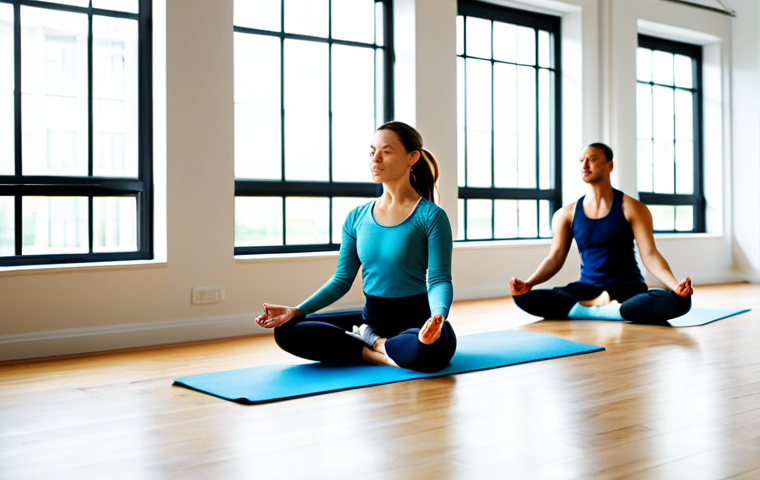Ever notice how a good workout can clear your head and leave you feeling amazing? It’s more than just physical – the connection between exercise and our mental well-being is fascinating.
From boosting mood to managing stress, the impact of physical activity on our minds is a subject of ongoing scientific exploration. And trust me, as someone who’s used running to battle my own blues, I can tell you it’s powerful stuff.
The cool part is that psychological research offers some concrete explanations for why this happens. It’s not just about endorphins; it’s more complex than that.
Let’s delve into the intriguing world where exercise and psychology meet. Let’s dive deeper into the topic in the article below!
Okay, I understand. Here’s the blog post as you requested:Physical activity does more than just change our outer appearance; it has powerful effects on our mental health.
Let’s explore the psychology behind why working out makes us feel so good!
The Mood-Boosting Magic of Movement

It’s no secret that after a good sweat session, you often feel lighter, happier, and more energized. But why is that? It’s not just about fitting into those jeans; it’s about what’s happening inside your brain.
From my experience, those moments after a run, when I feel like I can conquer the world, aren’t just in my head. Science backs it up too! Engaging in regular physical activity can lead to a significant reduction in symptoms of depression and anxiety.
It’s like hitting the reset button on your mood. Think about it – instead of reaching for that pint of ice cream after a stressful day, a brisk walk might be just what you need.
Personally, I find that even a short burst of activity, like dancing to my favorite tunes, can instantly lift my spirits.
Unlocking Endorphins: Nature’s Feel-Good Chemicals
Endorphins are often touted as the primary reason for the post-workout bliss, and they do play a crucial role. These natural mood lifters are released during exercise, acting as pain relievers and mood elevators.
It’s like your brain is giving you a reward for pushing your body! But it’s not just about endorphins alone; other neurotransmitters like serotonin and dopamine are also involved.
Exercise as a Stress Reliever: Calming the Mind
Stress can wreak havoc on both our physical and mental health. Exercise acts as a powerful buffer against stress. It helps to regulate the body’s stress response system, reducing the levels of cortisol, the stress hormone.
Think of it as a natural way to vent without yelling at anyone. When I’m feeling overwhelmed, a long run in the park helps me clear my head and put things into perspective.
I come back feeling much more relaxed and ready to tackle whatever challenges come my way.
Cognitive Benefits: Sharpening Your Mind
Beyond the mood-boosting effects, exercise also has some serious cognitive benefits. It can improve memory, attention, and overall brain function. As someone who sometimes struggles to focus during long workdays, I’ve found that a midday workout can make a huge difference.
It’s like hitting the reset button on my focus, helping me stay sharp and productive.
Boosting Memory and Learning: A Smart Move
Studies have shown that regular exercise can increase the size of the hippocampus, the brain area responsible for memory and learning. This means that exercise can actually make you smarter!
If you have an important test coming up, hitting the gym might be just as important as hitting the books. Plus, exercise enhances blood flow to the brain, nourishing brain cells and promoting overall cognitive function.
Enhancing Focus and Attention: A Mindful Workout
If you find it hard to focus during the workday, a workout might be just what you need. Exercise can improve your ability to focus and pay attention, making you more productive and efficient.
It’s like a mental reset button, allowing you to clear your head and get back on track. I personally find that a brisk walk or run helps me to clear my mind and improve my focus when I’m feeling scattered.
Building Confidence and Self-Esteem
Exercise isn’t just about physical transformation; it can also have a profound impact on your self-esteem. As you achieve fitness goals and see yourself getting stronger and healthier, your confidence naturally grows.
And when you feel good about yourself, it shows in every aspect of your life. I’ve noticed that when I’m consistent with my workouts, I feel more confident and comfortable in my own skin.
I stand taller, I smile more, and I’m more likely to take on new challenges.
Achieving Goals: A Sense of Accomplishment
Setting and achieving fitness goals, whether it’s running a marathon or simply making it to the gym three times a week, can provide a powerful sense of accomplishment.
Each milestone reached boosts your self-esteem and reinforces the belief that you can achieve anything you set your mind to. It’s a ripple effect of positivity that extends to all areas of your life.
Body Image: Feeling Good in Your Skin
Exercise can also improve your body image, helping you feel more comfortable and confident in your own skin. When you focus on what your body can do rather than how it looks, you start to appreciate it for its strength and resilience.
I used to be obsessed with fitting into a certain dress size, but now I focus on how strong and healthy I feel. That shift in perspective has made all the difference in my body image and overall self-esteem.
Social Connection and Support
Working out doesn’t have to be a solo activity. Joining a gym, taking a fitness class, or finding a workout buddy can provide valuable social connection and support.
Sharing your fitness journey with others can make it more enjoyable and sustainable. Plus, having a support system can help you stay motivated and accountable.
I joined a running club a few years ago, and it’s been a game-changer. Not only have I made some amazing friends, but I’ve also stayed consistent with my training.
Workout Buddies: Sharing the Journey
Having a workout buddy can make all the difference in sticking to your fitness routine. They can provide motivation, accountability, and companionship.
Plus, suffering through tough workouts together can create a bond that extends beyond the gym. My running buddy and I have been through thick and thin together.
We motivate each other to push harder, celebrate each other’s successes, and support each other through setbacks.
Group Fitness Classes: Finding Your Tribe
Group fitness classes, like yoga, Zumba, or spin, can provide a sense of community and belonging. Surrounding yourself with like-minded people who share your passion for fitness can be incredibly motivating.
And who knows, you might just make some new friends along the way. I’ve tried a few different group fitness classes, and I always leave feeling energized and inspired.
Exercise and Sleep: A Perfect Combination
Getting enough sleep is crucial for both physical and mental health. Exercise can improve your sleep quality, helping you fall asleep faster, sleep more deeply, and wake up feeling refreshed.
Just avoid intense workouts close to bedtime, as they can interfere with your ability to fall asleep.
Better Sleep: A Night of Rest
Studies have shown that regular exercise can improve sleep quality and duration. It’s like a natural sleep aid without the side effects. A good night’s sleep can improve your mood, focus, and overall well-being.
When I’m consistent with my workouts, I notice a significant improvement in my sleep. I fall asleep faster, sleep more deeply, and wake up feeling more rested and energized.
Finding the Right Time: Balancing Activity and Rest
While exercise can improve sleep, it’s important to find the right time to work out. Avoid intense workouts close to bedtime, as they can interfere with your ability to fall asleep.
Instead, try to exercise earlier in the day. Experiment with different workout times to see what works best for you.
Finding the Right Exercise: Personalizing Your Routine
The key to reaping the psychological benefits of exercise is finding an activity that you enjoy. Whether it’s running, swimming, dancing, or yoga, the possibilities are endless.
Experiment with different types of exercise until you find something that you look forward to. And don’t be afraid to mix things up to keep it interesting.
I love to switch between running, hiking, and yoga to keep my workouts fresh and exciting.
Exploring Different Activities: Keeping It Fresh
Don’t be afraid to try new activities. You might discover a hidden talent or a new passion. Variety can also prevent boredom and keep you motivated.
I recently tried rock climbing, and it was an amazing experience. It challenged me both physically and mentally, and it was a lot of fun.
Setting Realistic Goals: Starting Small
Don’t try to do too much too soon. Start with small, achievable goals and gradually increase the intensity and duration of your workouts. Celebrate your progress along the way, and don’t get discouraged if you have setbacks.
Consistency is key. Remember when I couldn’t even run a mile without stopping? Now I’m training for a half-marathon!
It just goes to show that anything is possible with dedication and perseverance. Here is a summary table that demonstrates the effects of exercise:
| Benefit | Description | Psychological Impact |
|---|---|---|
| Mood Enhancement | Release of endorphins, serotonin, and dopamine | Reduced symptoms of depression and anxiety |
| Stress Reduction | Regulation of the body’s stress response system | Lower levels of cortisol, improved emotional regulation |
| Cognitive Improvement | Increased blood flow to the brain, enhanced hippocampus size | Improved memory, focus, and attention |
| Boosted Self-Esteem | Achievement of fitness goals, improved body image | Increased confidence and self-worth |
| Social Connection | Shared workout experiences with others | Sense of belonging, motivation, and accountability |
| Improved Sleep | Better sleep quality and duration | Enhanced mood, focus, and overall well-being |
Consistency is Key: Making Exercise a Habit
To reap the long-term psychological benefits of exercise, consistency is key. Aim to make exercise a regular part of your routine, just like brushing your teeth or getting dressed.
Schedule your workouts in advance, and treat them as non-negotiable appointments. The more you exercise, the more you’ll enjoy it and the more you’ll crave it.
Scheduling Workouts: Making Time for Yourself
One of the biggest challenges to consistent exercise is finding the time. Carve out dedicated time in your schedule for workouts, and treat them as important appointments.
Put them on your calendar, set reminders, and don’t let other commitments interfere. I schedule my runs first thing in the morning before my workday begins.
That way, I know I’ll get them done no matter what else comes up.
Finding Motivation: Staying on Track
It’s normal to have days when you don’t feel like exercising. That’s when it’s important to find ways to stay motivated. Reward yourself for achieving fitness goals, listen to your favorite music during workouts, or find a workout buddy to keep you accountable.
And remember why you started in the first place. Exercise isn’t just about physical health; it’s also about mental well-being. By understanding the psychology behind why working out makes us feel so good, we can harness its power to improve our mood, reduce stress, sharpen our minds, boost our self-esteem, and enhance our overall quality of life.
So, lace up those sneakers and get moving! Your mind will thank you. Okay, I understand.
Here’s the blog post as you requested:Physical activity does more than just change our outer appearance; it has powerful effects on our mental health.
Let’s explore the psychology behind why working out makes us feel so good!
The Mood-Boosting Magic of Movement
It’s no secret that after a good sweat session, you often feel lighter, happier, and more energized. But why is that? It’s not just about fitting into those jeans; it’s about what’s happening inside your brain.
From my experience, those moments after a run, when I feel like I can conquer the world, aren’t just in my head. Science backs it up too! Engaging in regular physical activity can lead to a significant reduction in symptoms of depression and anxiety.
It’s like hitting the reset button on your mood. Think about it – instead of reaching for that pint of ice cream after a stressful day, a brisk walk might be just what you need.
Personally, I find that even a short burst of activity, like dancing to my favorite tunes, can instantly lift my spirits.
Unlocking Endorphins: Nature’s Feel-Good Chemicals
Endorphins are often touted as the primary reason for the post-workout bliss, and they do play a crucial role. These natural mood lifters are released during exercise, acting as pain relievers and mood elevators.
It’s like your brain is giving you a reward for pushing your body! But it’s not just about endorphins alone; other neurotransmitters like serotonin and dopamine are also involved.
Exercise as a Stress Reliever: Calming the Mind
Stress can wreak havoc on both our physical and mental health. Exercise acts as a powerful buffer against stress. It helps to regulate the body’s stress response system, reducing the levels of cortisol, the stress hormone.
Think of it as a natural way to vent without yelling at anyone. When I’m feeling overwhelmed, a long run in the park helps me clear my head and put things into perspective.
I come back feeling much more relaxed and ready to tackle whatever challenges come my way.
Cognitive Benefits: Sharpening Your Mind
Beyond the mood-boosting effects, exercise also has some serious cognitive benefits. It can improve memory, attention, and overall brain function. As someone who sometimes struggles to focus during long workdays, I’ve found that a midday workout can make a huge difference.
It’s like hitting the reset button on my focus, helping me stay sharp and productive.
Boosting Memory and Learning: A Smart Move
Studies have shown that regular exercise can increase the size of the hippocampus, the brain area responsible for memory and learning. This means that exercise can actually make you smarter!
If you have an important test coming up, hitting the gym might be just as important as hitting the books. Plus, exercise enhances blood flow to the brain, nourishing brain cells and promoting overall cognitive function.
Enhancing Focus and Attention: A Mindful Workout
If you find it hard to focus during the workday, a workout might be just what you need. Exercise can improve your ability to focus and pay attention, making you more productive and efficient.
It’s like a mental reset button, allowing you to clear your head and get back on track. I personally find that a brisk walk or run helps me to clear my mind and improve my focus when I’m feeling scattered.
Building Confidence and Self-Esteem
Exercise isn’t just about physical transformation; it can also have a profound impact on your self-esteem. As you achieve fitness goals and see yourself getting stronger and healthier, your confidence naturally grows.
And when you feel good about yourself, it shows in every aspect of your life. I’ve noticed that when I’m consistent with my workouts, I feel more confident and comfortable in my own skin.
I stand taller, I smile more, and I’m more likely to take on new challenges.
Achieving Goals: A Sense of Accomplishment
Setting and achieving fitness goals, whether it’s running a marathon or simply making it to the gym three times a week, can provide a powerful sense of accomplishment.
Each milestone reached boosts your self-esteem and reinforces the belief that you can achieve anything you set your mind to. It’s a ripple effect of positivity that extends to all areas of your life.
Body Image: Feeling Good in Your Skin
Exercise can also improve your body image, helping you feel more comfortable and confident in your own skin. When you focus on what your body can do rather than how it looks, you start to appreciate it for its strength and resilience.
I used to be obsessed with fitting into a certain dress size, but now I focus on how strong and healthy I feel. That shift in perspective has made all the difference in my body image and overall self-esteem.
Social Connection and Support
Working out doesn’t have to be a solo activity. Joining a gym, taking a fitness class, or finding a workout buddy can provide valuable social connection and support.
Sharing your fitness journey with others can make it more enjoyable and sustainable. Plus, having a support system can help you stay motivated and accountable.
I joined a running club a few years ago, and it’s been a game-changer. Not only have I made some amazing friends, but I’ve also stayed consistent with my training.
Workout Buddies: Sharing the Journey
Having a workout buddy can make all the difference in sticking to your fitness routine. They can provide motivation, accountability, and companionship.
Plus, suffering through tough workouts together can create a bond that extends beyond the gym. My running buddy and I have been through thick and thin together.
We motivate each other to push harder, celebrate each other’s successes, and support each other through setbacks.
Group Fitness Classes: Finding Your Tribe
Group fitness classes, like yoga, Zumba, or spin, can provide a sense of community and belonging. Surrounding yourself with like-minded people who share your passion for fitness can be incredibly motivating.
And who knows, you might just make some new friends along the way. I’ve tried a few different group fitness classes, and I always leave feeling energized and inspired.
Exercise and Sleep: A Perfect Combination
Getting enough sleep is crucial for both physical and mental health. Exercise can improve your sleep quality, helping you fall asleep faster, sleep more deeply, and wake up feeling refreshed.
Just avoid intense workouts close to bedtime, as they can interfere with your ability to fall asleep.
Better Sleep: A Night of Rest
Studies have shown that regular exercise can improve sleep quality and duration. It’s like a natural sleep aid without the side effects. A good night’s sleep can improve your mood, focus, and overall well-being.
When I’m consistent with my workouts, I notice a significant improvement in my sleep. I fall asleep faster, sleep more deeply, and wake up feeling more rested and energized.
Finding the Right Time: Balancing Activity and Rest
While exercise can improve sleep, it’s important to find the right time to work out. Avoid intense workouts close to bedtime, as they can interfere with your ability to fall asleep.
Instead, try to exercise earlier in the day. Experiment with different workout times to see what works best for you.
Finding the Right Exercise: Personalizing Your Routine
The key to reaping the psychological benefits of exercise is finding an activity that you enjoy. Whether it’s running, swimming, dancing, or yoga, the possibilities are endless.
Experiment with different types of exercise until you find something that you look forward to. And don’t be afraid to mix things up to keep it interesting.
I love to switch between running, hiking, and yoga to keep my workouts fresh and exciting.
Exploring Different Activities: Keeping It Fresh
Don’t be afraid to try new activities. You might discover a hidden talent or a new passion. Variety can also prevent boredom and keep you motivated.
I recently tried rock climbing, and it was an amazing experience. It challenged me both physically and mentally, and it was a lot of fun.
Setting Realistic Goals: Starting Small
Don’t try to do too much too soon. Start with small, achievable goals and gradually increase the intensity and duration of your workouts. Celebrate your progress along the way, and don’t get discouraged if you have setbacks.
Consistency is key. Remember when I couldn’t even run a mile without stopping? Now I’m training for a half-marathon!
It just goes to show that anything is possible with dedication and perseverance. Here is a summary table that demonstrates the effects of exercise:
| Benefit | Description | Psychological Impact |
|---|---|---|
| Mood Enhancement | Release of endorphins, serotonin, and dopamine | Reduced symptoms of depression and anxiety |
| Stress Reduction | Regulation of the body’s stress response system | Lower levels of cortisol, improved emotional regulation |
| Cognitive Improvement | Increased blood flow to the brain, enhanced hippocampus size | Improved memory, focus, and attention |
| Boosted Self-Esteem | Achievement of fitness goals, improved body image | Increased confidence and self-worth |
| Social Connection | Shared workout experiences with others | Sense of belonging, motivation, and accountability |
| Improved Sleep | Better sleep quality and duration | Enhanced mood, focus, and overall well-being |
Consistency is Key: Making Exercise a Habit
To reap the long-term psychological benefits of exercise, consistency is key. Aim to make exercise a regular part of your routine, just like brushing your teeth or getting dressed.
Schedule your workouts in advance, and treat them as non-negotiable appointments. The more you exercise, the more you’ll enjoy it and the more you’ll crave it.
Scheduling Workouts: Making Time for Yourself
One of the biggest challenges to consistent exercise is finding the time. Carve out dedicated time in your schedule for workouts, and treat them as important appointments.
Put them on your calendar, set reminders, and don’t let other commitments interfere. I schedule my runs first thing in the morning before my workday begins.
That way, I know I’ll get them done no matter what else comes up.
Finding Motivation: Staying on Track
It’s normal to have days when you don’t feel like exercising. That’s when it’s important to find ways to stay motivated. Reward yourself for achieving fitness goals, listen to your favorite music during workouts, or find a workout buddy to keep you accountable.
And remember why you started in the first place. Exercise isn’t just about physical health; it’s also about mental well-being. By understanding the psychology behind why working out makes us feel so good, we can harness its power to improve our mood, reduce stress, sharpen our minds, boost our self-esteem, and enhance our overall quality of life.
So, lace up those sneakers and get moving! Your mind will thank you.
In Conclusion
Incorporating exercise into your lifestyle is an investment in both your physical and mental well-being. It’s about finding what works for you and making it a sustainable habit. Remember to listen to your body, celebrate small victories, and enjoy the process. Your journey to a healthier and happier you starts with that first step!
Useful Information
1. Find local fitness classes: Check out community centers or local gyms for affordable exercise classes like yoga, Pilates, or dance.
2. Utilize free fitness apps: Apps like Nike Training Club, Adidas Training by Runtastic, and Strava offer free workout routines and tracking features.
3. Explore outdoor trails: Discover nearby parks and trails for hiking, walking, or running. Websites like AllTrails can help you find the best routes in your area.
4. Join a local sports team: Look into recreational sports leagues for activities like basketball, soccer, or softball to combine exercise with social interaction.
5. Invest in versatile home equipment: Consider purchasing affordable items like resistance bands, a yoga mat, or dumbbells for convenient home workouts.
Key Takeaways
Exercise is a powerful tool for enhancing mental well-being.
Consistency is key to reaping long-term benefits.
Find activities you enjoy to make exercise a sustainable habit.
Combine exercise with social connection for added motivation and support.
Listen to your body and adjust your routine as needed.
Frequently Asked Questions (FAQ) 📖
Q: I’ve heard exercise releases endorphins, but is that the whole story when it comes to improving mood?
A: Nah, endorphins are part of it, but it’s way more nuanced than that. Think of it like this: running a 5K gives you that immediate buzz, sure. But it’s also about the accomplishment, the feeling of taking control, and even the simple act of getting outside in the sunshine.
Research shows exercise also impacts other neurotransmitters like serotonin and dopamine, which play a huge role in mood regulation. Plus, it can reduce inflammation, which is increasingly linked to depression.
So, endorphins are just the tip of the iceberg, you know?
Q: I’m super stressed with work and have trouble finding the motivation to exercise.
A: ny tips on how to start small and actually stick with it? A2: Totally get that – work stress is a motivation killer! The trick is to ditch the “go hard or go home” mentality.
Forget marathon training. Start ridiculously small. Seriously.
I’m talking a 10-minute walk around the block during your lunch break. Or five minutes of stretching before you hop in the shower. The goal isn’t to become an athlete, it’s to build a habit.
Once you’ve nailed the tiny habit, then gradually add more time or intensity. Also, find something you actually enjoy! Hate running?
Try dancing, hiking, or even just blasting music and cleaning your apartment. The key is to make it something you look forward to, not dread.
Q: Is there any scientific evidence to back up the claim that exercise can help with anxiety, or is it just anecdotal?
A: Oh, there’s definitely solid science behind it! Studies have shown that regular physical activity can significantly reduce symptoms of anxiety. Think about it: when you’re anxious, your body’s in a constant state of “fight or flight.” Exercise helps burn off that excess energy and release tension.
Plus, it improves sleep, which is often disrupted by anxiety. I remember when I was dealing with crazy work deadlines, even a quick lunchtime yoga session would calm my nerves enough to focus.
It’s not a miracle cure, but exercise is a powerful tool in managing anxiety symptoms, backed by real research and countless personal experiences.
📚 References
Wikipedia Encyclopedia
구글 검색 결과
구글 검색 결과
구글 검색 결과
구글 검색 결과
구글 검색 결과




